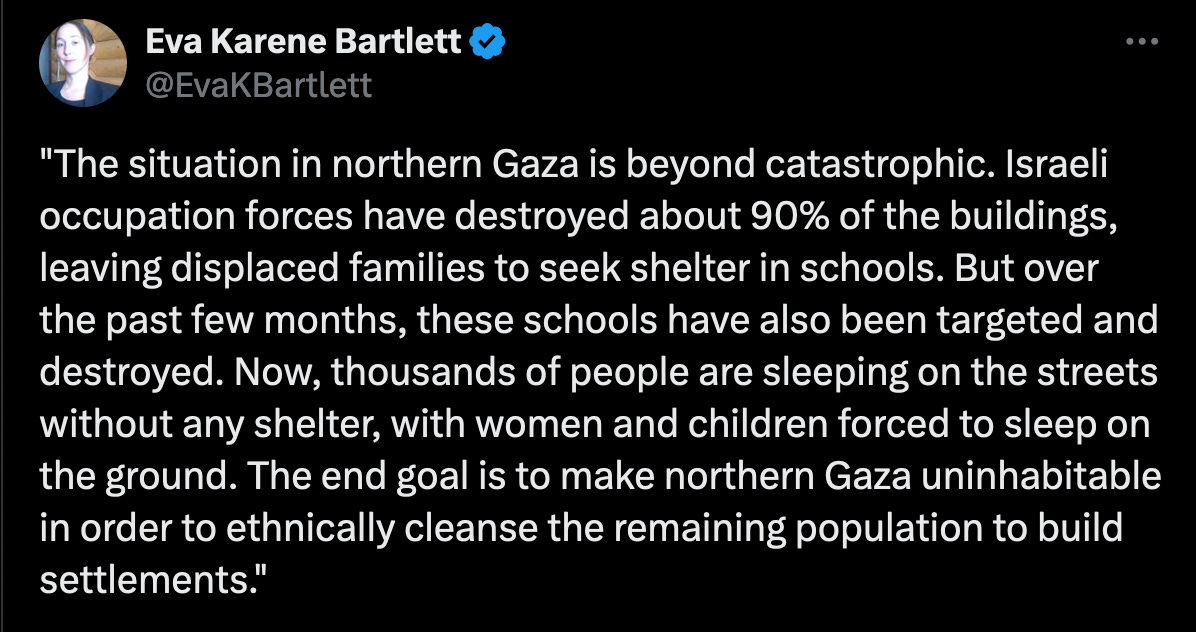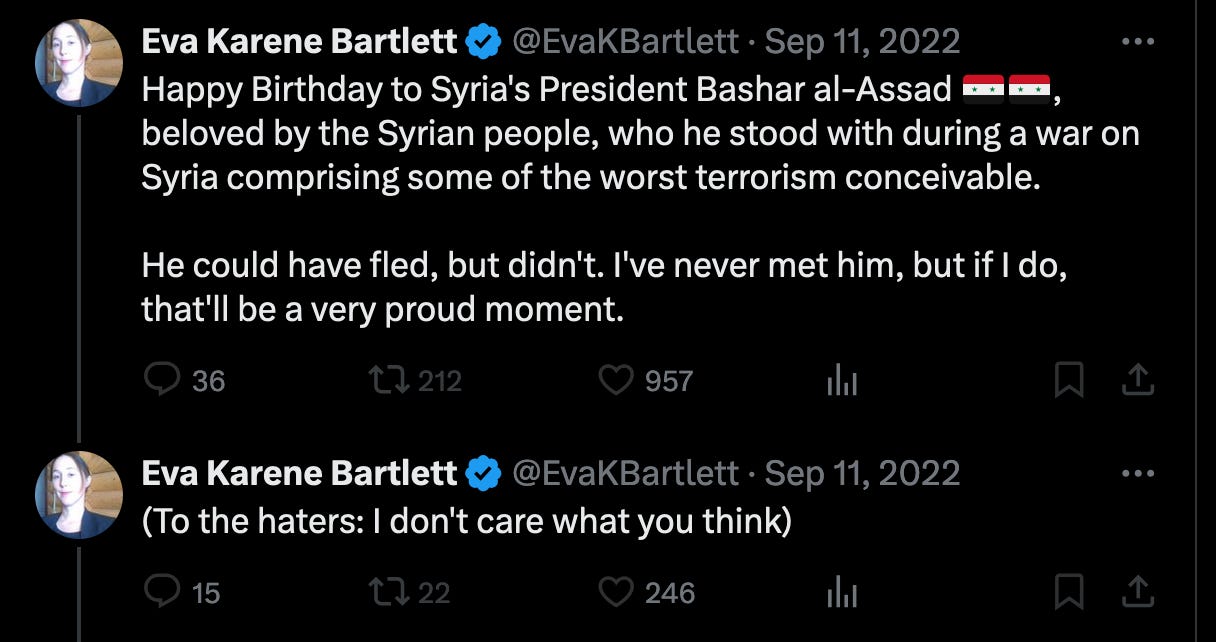Assad Has Fallen. Tankies Are Not Okay.
Their reaction exposes a worldview that is retrograde, morally bankrupt, and very, very weird.

At first glance, Aaron Maté might seem like a staunch defender of Palestinian rights. On any given day, his Twitter feed broadcasts a torrent of invective at Israel over its brutal assault on Gaza:
Maté is equally unsparing when it comes to Israel’s U.S. enablers:
Such sentiments are hardly unreasonable. Since Hamas’s terrorist attack on October 7th, 2023, Israel has unleashed a hellish onslaught on Gaza’s Palestinians in what many human rights experts are calling a genocide.
Upon closer examination, however, Maté’s apparent concern for Palestinian rights starts to look a bit murkier.1 In 2021, he visited Yarmouk, an area on the outskirts of Damascus in southwestern Syria. Once home to 250,000 residents, including 160,000 Palestinian refugees and their descendants who were expelled from Israel beginning in 1948, the vast majority fled the town in 2013. Spurring their departure was a ruthless siege imposed by Syria’s then-ruler, Bashar al-Assad.
In the ensuing years, Yarmouk’s few remaining inhabitants endured constant aerial assaults at the hands of regime forces. Later, they fell under the barbaric rule of ISIS once it occupied the town in 2015. Eventually, in 2018, the government reached an accord with the rebels and retook the city.
But would its former residents be able to return? This was the subject of a May 2021 video featuring Maté and set against the background of the ravaged city.
“Why is it,” he asked, “that Syrians and Palestinians who were displaced from their homes in a U.S.-backed dirty war don’t have the right to come back and rebuild what the U.S. and its allies helped destroy? His answer was simple: Western sanctions prevented the government from accessing the funds and supplies needed for reconstruction.
If this worldview strikes you as odd, there is a good reason for that: It contradicts the entire philosophical basis that underpins the modern world.
Before moving on, it is worth explaining how Maté got access to the regime-occupied town in the first place. Did he enter at his own risk in brave defiance of the powers-that-be? Far from it; he was present at the invitation of the regime and on a guided tour by Assad’s agents.
As one might expect, such offers are not extended to just anyone—only those who promise to advance the regime’s agenda. On this score, Maté did not disappoint. Assad, in all his benevolence, would love for the refugees to return, we are led to believe—if only the West would loosen its crippling sanctions and let him rebuild.
There was some truth to this. For decades, Syria has been subject to a ruinous trade embargo by Western powers, one which did not undermine Assad so much as it worsened the suffering of his people. But thanks to the support of Russia and Iran, his regime was not exactly living on a shoestring.
The fact is, the government did not want the refugees to return. It sought instead to expropriate the land under the guise of “redevelopment” in order to enrich regime insiders. This, at least, was the conclusion of a deeply researched report by the Middle East Institute. (While the Institute receives substantial funding from the Gulf monarchies, it maintains editorial independence, criticizes wrongdoing by its sponsors, discloses its major donors, and publishes legitimate research as opposed to tendentious nonsense—which is more than can be said for Maté’s employer, The Grayzone News).
Here is what the authors found:
Despite the Syrian regime’s official discourse ostensibly promoting return, the practical reality draws a vastly different picture. The regime perceives such return as a temporary phase until it can mobilize the financial means and power to impose regulatory plans, which ultimately will lead to the complete demolition of remaining properties and the displacement of the entire population. This vision has been explicitly stated by regime officials on multiple occasions.
To further this aim, the government imposed onerous and unrealistic requirements on anyone wishing to come back—with the predictable result that returns amounted to a trickle by the time Maté arrived in May 2021. It took a multi-year pressure campaign by N.G.O.s and local elites to compel the authorities to allow returns en masse.
Their efforts paid off, with around 50,000 out of a prewar population of 250,000 coming back as of mid-2024. But few expected to stay very long given the likelihood that they would be re-expelled.
Seeing Like a Tankie…
Thus, the facts paint a far different picture than the one Maté offered. His story exonerating Assad either originated in his head or, more likely, was spoon-fed by his regime handlers.
Still, it does raise the question of why his commitment to Palestinian rights extends only to some Palestinians and not to others. Why is it that he can denounce their criminal bombardment and displacement at Israel’s hands while resorting to shameless deflection in the case of similar crimes by Assad?
It is a profoundly anti-modern worldview. Only instead of challenging modernity’s failings, such as poverty and social alienation, it repudiates the good parts, like democracy and human rights.
The answer, it turns out, is right there in the question. For Maté, whether or not Palestinians are worthy victims hinges on the identity of their oppressor. If Palestinian rights are violated by the United States or an ally thereof, they deserve our sympathy and recognition. If, by contrast, they suffer under a regime which Maté sees as a victim of American empire—and Assad’s certainly fit the bill in that regard—then they have no rights their ruler is bound to respect.
If this worldview strikes you as odd, there is a good reason for that: It contradicts the entire philosophical basis that underpins the modern world. From the advent of human civilization, rulers derived their legitimate authority by virtue of their innate superiority over their subjects. For millennia, everything in the universe was thought to occupy its rightful place in a divinely ordained Great Chain of Being. At the top of the hierarchy stood God, while below him sat angels, humans, animals, and, finally, other living things. Moreover, each of these categories featured its own subdivisions which themselves were organized hierarchically. Among humans, kings naturally stood above nobles, who in turn had authority over everyone else.
Eventually, the Enlightenment came along and exposed this nonsense for what it was. Instead of blindly accepting received wisdom, thinkers like John Locke and Immanuel Kant reasoned that all humans have equal value. Accordingly, they should be granted rights to protect them from the powerful—including the right to choose who governs them and how.
Today, these ideas infuse the way most of us think about the world. By the time we come of age, we gain an almost instinctive appreciation for the primacy of the individual as the fundamental unit of moral worth.
But for people like Maté, that process somehow got short-circuited—this despite their privileged upbringings complete with the best educations money can buy. As far as they are concerned, the rights of regular people are trumped by those of the regimes that rule over them.
Importantly, however, only some regimes merit such deference—in particular, those which stand in opposition to the villainous West. These regimes are considered victims of America and its allies, who, in turn, are seen as perpetrators.
In this regard, Maté and his fellow-travelers resemble the tankies of the Cold War era, so-called for their apologias for the Soviet tanks which crushed anti-communist uprisings in Hungary and Czechoslovakia. Today, Maté and other ostensible leftists run cover for the likes of Putin and Assad as they suppress revolts against their own rule.
But where does this leave the actual human beings who languish under them? Well, their rights must be sacrificed to safeguard the reputations of their oppressors. The latter, after all, are the real victims in this story, not the people they tyrannize.
The thing is, once tankies designate a given regime as a perpetrator or victim, its status becomes fixed. Perpetrator regimes are eternally perpetrators and victim regimes forever victims, no matter what they do. This means that any apparent crime by a victim regime must be rationalized and twisted around until it can be blamed on America and its allies. The idea is to let regimes that oppose the West—namely, those of Syria, Russia, China, Iran, and Venezuela—off the hook.
It is a profoundly anti-modern worldview. Only instead of challenging modernity’s failings, such as poverty and social alienation, it repudiates the good parts, like democracy and human rights.
…and Going Blind Like a Tankie
Is placing a dense urban area under total siege a bad thing to do? What about carpet-bombing it to make conditions as uninhabitable as possible so that the residents are forced to flee? Would this too merit rebuke—or at least some acknowledgement?
Most of us would answer with an unqualified “yes.” These are war crimes, after all. But for some people, it depends on who’s committing them. If the offender is Israel, then it should be condemned. If, instead, it is Assad—well, perhaps he should get a pass.
Now, tankies do understand that they are different from most people. In fact, they try to compensate for their peculiarities by presenting themselves as normal—much like psychopaths unable to experience empathy understand it as a concept and use it to manipulate others.
Take Aleppo, the northern Syrian city that was leveled by Assadist and Russian forces in the second half of 2016. Together, they were responsible for the vast majority of the war crimes that occurred there during that period, according to an analysis of more than 1700 videos by the Syrian Archive. Among their offenses were the use of cluster, incendiary, and barrel bombs that targeted schools and hospitals in crowded civilian areas.
Anyone who spends time publicizing war crimes in Syria might have been expected to devote at least some attention to these atrocities. Not Aaron Maté. A search for “Aleppo” in his Twitter history returns plenty of mentions of alleged violations by Israeli and anti-Assad forces as well as accounts of how bad things were before the Syrian government recaptured the city.
But violations by Assad and his Russian ally—which, again, accounted for most of the crimes committed in Aleppo? Forget about it. Of the three instances when Maté even alluded to the coalition’s aerial assaults, one describes them in the past-exonerative (“bombing a dense city can’t be justified—anywhere, be it Aleppo, Mosul, or Raqqa”). In another, he attacks a documentary about Russia’s deliberate attacks on civilians by changing the subject to atrocities by anti-Assad forces.
The third acknowledges Russia’s crimes before promptly shifting the blame onto the West:
This anti-modern outlook, which is shared by the entire tankie community, has blossomed in all its splendid idiocy in the days since Assad’s fall. For example, Max Blumenthal, The Grayzone News editor who once filmed a pro-Assad PR video in Damascus within walking distance of several notorious torture facilities, is incensed over what he claims is a Western-backed conspiracy to topple the country’s ruler:
Then there is Wyatt Reed, seen below denouncing the alleged killing of religious minorities by the victorious rebels. Of course, Assad and his proxies also massacred religious minorities. Of the 56 sectarian massacres identified by the Syrian Network for Human rights between 2011 and 2015, 49 were committed by Assad or his allies. For Reed, however, these victims do not carry much weight. Their mistake? Getting murdered by the wrong side.
Anya Parampil, for her part, shed a wistful tear for the good old days when Assad had all but finished the job of pounding his country into submission. As she sees it, anyone who believes the overwhelming evidence of the regime’s vast torture system, its carpet-bombing of civilian centers, and the hundreds of chemical weapons attacks it carried out are deluding themselves. Things were actually great under Assad—at least from the standpoint of someone who could watch it unfold from her cushy perch in Brooklyn.
Astrologer-cum-tankie Caitlin Johnstone laments Assad’s ouster for what it portends for Syria’s international alignment. Any implications for the little people who reside there get short-shrift in her telling, shunted aside to make way for the actors who truly matter: the Assad regime and the American empire that iniquitously removed it.
Now, tankies do understand that they are different from most people. In fact, they try to compensate for their peculiarities by presenting themselves as normal—much like psychopaths unable to experience empathy understand it as a concept and use it to manipulate others. Although tankies dismiss the notion of Enlightenment individualism, they can grasp why the rest of us would subscribe to it. They therefore pose as adherents of the idea in the course of gaslighting their audience.
For example, here is Eva Bartlett pretending to care about the plight of Palestinians:
Seems normal, right? Only dig a bit deeper and you will find a very different set of priorities:
You Can Have Principles or Be a Nihilist. Pick One.
If most of us give pride of place to the individual over some higher authority, that is a good thing. Among other virtues, it allows us to denounce crimes against human dignity regardless of who the perpetrator or victims happen to be. By keeping the rights of the individual as our lodestar, we can call out Hamas’s savagery for what it is while also decrying Israel for its far more destructive crimes. We can also condemn America for its own outrages, whether the genocidal subjugation of Native Americans, the enslavement of African Americans, or the carnage it wrought through its bloody interventions abroad. At the same time, we can maintain our present focus on the genocide Russia is committing at this very moment.
But to immunize a select group of autocratic regimes, as tankies do, is to debase the actual victims. To adopt this perspective, one must forgo the guidance of any principle—at least a defensible one. It is not just that they trash their own integrity; they lend credence to distorted narratives which sanitize some of the world’s most horrific autocrats and war criminals—all while masquerading as defenders of human rights.
With an audience that numbers in the millions, it might seem futile to try and counter their propaganda. Still, those of us who can have a duty to push back.
Hat-tip to Patrick Hilsman for pointing out the following example of Maté’s hypocrisy.













Wyatt Reed's link to dilshadkhalaf (https://x.com/dilshadkhalaf/status/1866176314295943560) is not available.
Are those tankies just not making living? I mean, you are giving them too much of ideas to hold in their heads.
Been waiting for your analysis, Neil. Thanks, right on time.